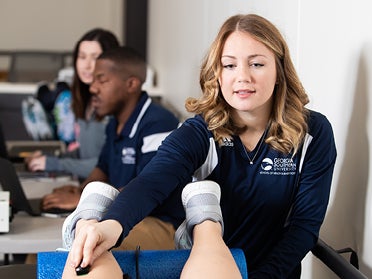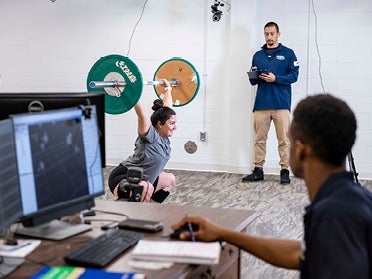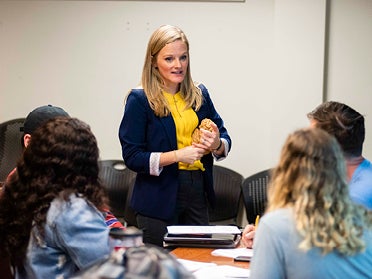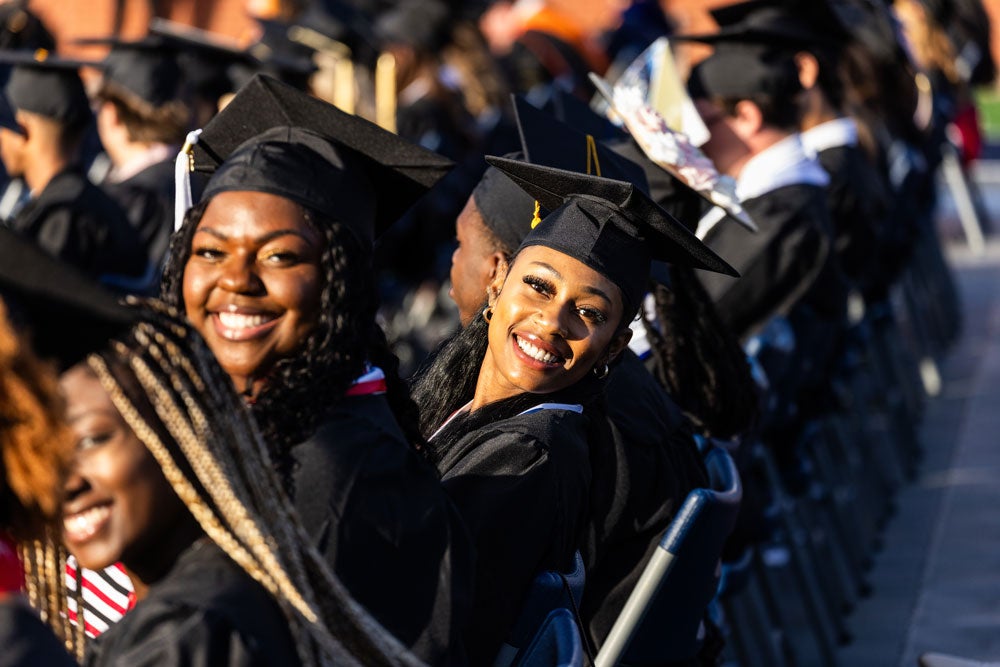Georgia Southern University’s Master of Science in Kinesiology with a Sport and Exercise Psychology concentration integrates science and application in mental skills training and life skills development.
Locations
- Statesboro Campus (In Person)
Why Earn a Master’s Degree in Sport and Exercise Psychology at Georgia Southern University?
- 10:1 student-to-faculty ratio.
- 100% of students in the program have received fully-funded graduate assistantships over the past 12 years.
- Prepare for certification as a Certified Mental Performance Consultant (CMPC®) through a curriculum aligned with Association for Applied Sport Psychology standards.
- Graduates of the program have a 100% pass rate on the Certified Mental Performance Consultant® exam.
- Work with established leaders in the profession who serve on AASP and APA Executive Boards.
- Both faculty members are CMPCs and will mentor students’ applied experiences toward certification.
- Choose from an internship or thesis track reflecting your professional goals.
- All students complete a mentored applied practicum.
- Opportunities for first-author publications and presentations.
- Funding available for conference travel.
- Thirty-six credit hours to completion.
Within sport, exercise and performance settings, mental skills are just as important as one’s physical training. At Georgia Southern University’s Master of Science (MS) in Kinesiology program with a concentration in Sport and Exercise Psychology, you will gain an evidence-based understanding of how to help others develop the most effective mental state and associated skill sets to achieve their performance and well-being goals.
Designed for students interested in applied work and/or research in the sport and exercise psychology discipline, the degree is grounded in the fundamentals of the scientific process and theory for research and supervised applied work within individual and group/team environments. Following completion of the program, students are able to competitively pursue various applied and academic positions within the discipline and admission into doctoral and graduate programs.
The program also financially supports students’ graduate work. Graduate Assistantships, which include teaching in the Physical Activity Lifestyle program, teaching the laboratory portion of Human Anatomy and Physiology courses, working in the Department of Athletics and assisting with faculty research, are available to qualified applicants. Application materials for the graduate assistant positions can be obtained from the Department of Health Sciences and Kinesiology. Additionally, financial assistance is available through the Office of Financial Aid.
Ready to Apply?
What Can You Do With a Master’s Degree in Sport and Exercise Psychology?
Career and educational opportunities in sport and exercise psychology are diverse, ranging from consulting to academic-based employment. These include pursuing doctoral studies in sport psychology and/or counseling, working as mental skills consultants within sport, exercise and performance settings, teaching courses within university settings, working in research laboratories, athletic administration and advising, recreation administration and coaching.
Where are former students employed?
- Academic advisors in student-athlete services
- Mental skills consultants in professional sport settings, including Major League Baseball, United Soccer League, Major League Soccer and the National Women’s Soccer League
- Master resilience trainers providing performance enhancement services within the military
- Mental skills coordinators in university athletic departments
- Collegiate coaching positions
- Work in/own private practices
- Professors
- Life skills coordinators in university athletic departments
- Mental skills consultants at sport academies
- Weight management and exercise behavior consultants in fitness facilities or worksite health programs
Doctoral Studies
The master’s program in sport and exercise psychology also prepares students for advanced graduate study. Below is a list of some of the programs where students have been accepted following graduation:
- Adler University
- Auburn University
- Ball State University
- Clemson University
- Florida State University
- Georgia State University
- Georgia Tech University
- James Madison University
- Marquette University
- Michigan State University
- Springfield College
- Temple University
- Ohio State University
- University of Denver
- University of Idaho
- University of Indiana
- University of Kansas
- University of Missouri
- University of North Carolina, Greensboro
- University of North Texas
- University of Northern Colorado
- University of South Carolina
- University of Tennessee
- University of The Pacific
- University of Utah
- University of Wisconsin-Milwaukee
- West Virginia University
What You’ll Learn
Building on a foundation of rigorous coursework, you will learn to apply theory and science to real-life settings in your practicum, with opportunities available through University Athletics, collegiate sports, professional sports, youth sports, and the community. Choose from a thesis option to conduct research alongside active faculty scholars or the internship option for extended field experience. You will graduate from the program well-prepared for a future career in sport, exercise and performance psychology.
See the CurriculumBuild Your Experience
Add diverse research and/or applied experiences that extend your learning, help you cultivate additional skills, expand your connection to the profession and enhance your professional opportunities.

Sport and Exercise Psychology Internships
Select the internship track to gain in-depth, supervised experience applying the principles you’ve studied with clients in a sport, performance and exercise-related setting — enhancing your skill set for your career.

Thesis
With the thesis option, you can pursue your own investigation into sport, exercise and performance psychology, taking advantage of specialized facilities in two different Sport Psychology Labs to explore a topic of your choice.

Professional Development
Discover a variety of ways to grow as a professional. Engage in professional organizations, attend and present at regional and national conferences, get involved in applied and research experiences, serve on the executive committee of the Graduate Sport and Exercise Psychology Club and more.
Want to Learn More?
Explore essential information about our MS in Kinesiology, Sport and Exercise Psychology program, including application details, accreditation status, and licensing disclosures. Gain insight into the program’s credibility and requirements to help you start your journey toward success with the knowledge you need.
Applicants for the MS in Kinesiology, Sport and Exercise Psychology program must hold a bachelor’s degree from a regionally accredited institution with a minimum cumulative GPA of 3.0 (on a 4.0 scale). If your degree major or minor is not in psychology or kinesiology/exercise science, completion of prerequisite coursework may be required.
To apply, please submit:
- An online application. (There is a $50 nonrefundable application fee.)
- Transcripts for all prior college-level work. Copies can be uploaded with your application; official copies sent directly to the Office of Graduate Admissions will be required for admitted students.
- A curriculum vitae or résumé that includes the following:
- Work history
- Professional experiences
- Membership and participation in professional organizations
- Other experiences related to this program
- Three letters of reference. (Please have letter writers send these directly to gradadmissions@georgiasouthern.edu.)
- A personal statement of no more than three pages that includes a description of your previous professional experiences and accomplishments, career goals and reasons for interest in the graduate program at Georgia Southern University. Send your statement to gradadmissions@georgiasouthern.edu.
- A phone, video-based or in-person interview with the program director may be requested for some candidates after an initial review of submitted applications is completed.
Application Deadlines
All admitted students begin the program in the fall. The deadline for application submission is Feb. 1.
Your application and all required documents must be received by the deadline.
Provisional Admission
Provisional admission may be offered to students whose GPA falls between 2.75 and 2.99 but who otherwise meet the requirements and submit all application materials listed above.
Contact Information
Megan Byrd, PhD, CMPC
Program Director | Associate Professor of Sport and Exercise Psychology
912-478-2274
mmbyrd@georgiasouthern.edu
Brandonn Harris, PhD, CMPC, LPC, NCC, FAASP
Interim Chair | Professor and Program Director of Sport and Exercise Psychology
912-478-7900
bharris@georgiasouthern.edu
Various forms of financial assistance are also available through the Office of Financial Aid. In addition, Graduate Assistantships, which include teaching in the Physical Activity Lifestyle program, teaching the laboratory portion of Human Anatomy and Physiology, working in the Department of Athletics and/or assisting with faculty research, are available to qualified applicants. Application material for the graduate assistant positions can be obtained from the Department of Health Sciences and Kinesiology.
Many of the clinical programs offered by the Waters College of Health Professions (WCHP) require a clinical internship or practicum experience to fulfill degree requirements. Pursuant to the University’s legal agreements, participants in clinical experiences are required to abide by the workplace rules of the clinical site. The University is aware of recent federal requirements that would mandate vaccination against COVID-19 for those working in certain settings, including health care. At this time, we expect that these new requirements may significantly impact our ability to locate a placement for students who remain unvaccinated. As always, WCHP will continue to make every effort to place students at clinical sites. However, please be aware that we may be unable to locate a site to accept unvaccinated students, which may cause a delay or inability to progress and complete the program of study.
Contact Information
Department of Health Sciences and Kinesiology
Related Programs

Take the Next Step
Help others reach their potential and well-being with a master’s degree in sport and exercise psychology from Georgia Southern.
Contact Us
Megan Byrd, PhD, CMPC
Program Director | Associate Professor of Sport and Exercise Psychology
912-478-2274
mmbyrd@georgiasouthern.edu
Brandonn Harris, PhD, CMPC, LPC, NCC, FAASP
Interim Chair | Professor of Sport and Exercise Psychology
912-478-7900bharris@georgiasouthern.edu


